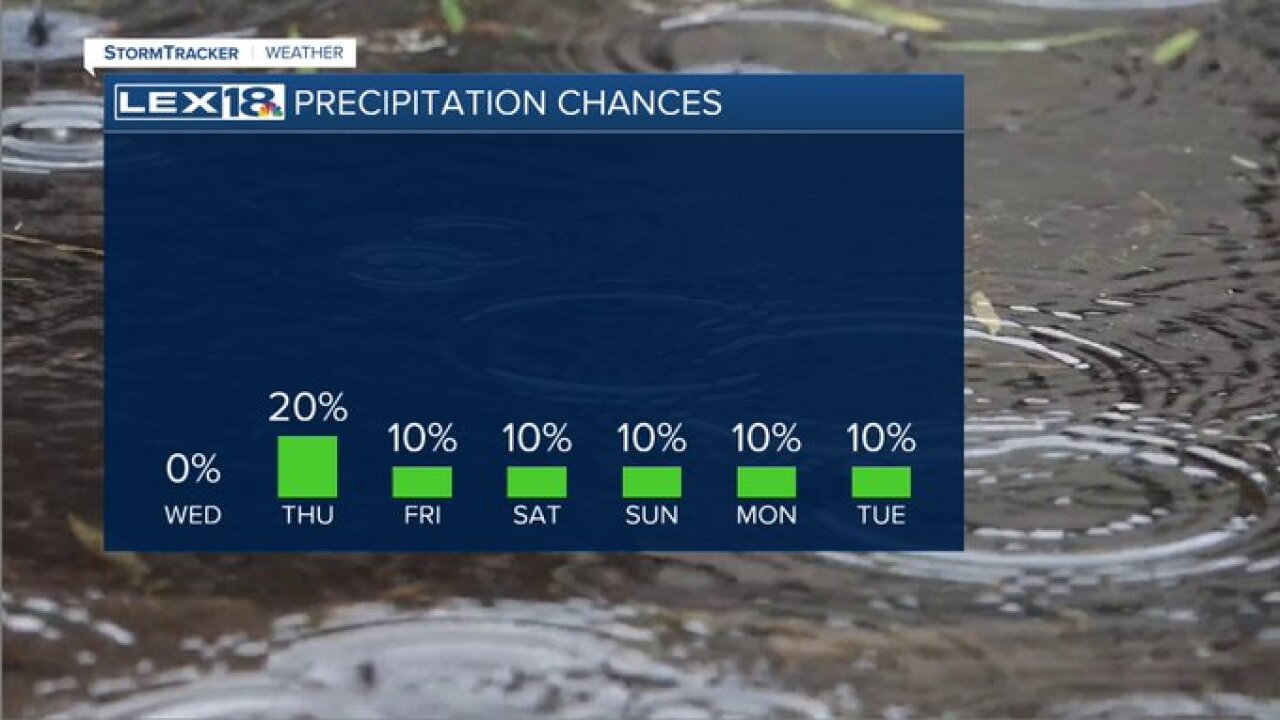Drier Weather Ahead: Tips And Advice For Your Home And Garden

Table of Contents
Protecting Your Garden During Drier Weather
Drier weather can significantly impact your garden's health. Implementing water conservation techniques and choosing drought-resistant plants are key to mitigating the effects of reduced rainfall.
Water Conservation Techniques
Efficient watering is crucial during drier weather. Here are some effective techniques:
- Deep watering less frequently: Instead of frequent shallow watering, water deeply and less often to encourage deeper root growth. This helps plants access water even during dry spells. Aim for soaking the soil to a depth of 6-12 inches.
- Mulching to retain soil moisture: Applying a layer of mulch (organic material like wood chips or straw) around plants helps retain soil moisture, reducing evaporation and the need for frequent watering.
- Using drought-tolerant plants and landscaping: Selecting plants naturally adapted to drier conditions minimizes water consumption. Consider native plants, succulents, and other low-water varieties. Xeriscaping, a landscaping style that minimizes water usage, is also beneficial.
- Implementing rainwater harvesting systems: Collect rainwater from rooftops and gutters to use for irrigation, reducing your reliance on municipal water supplies. This is especially helpful during prolonged periods of drier weather.
- Regularly checking soil moisture levels: Use a soil moisture meter or simply stick your finger a few inches into the soil to check moisture levels before watering. This prevents overwatering and ensures efficient water use.
Identifying and Addressing Signs of Drought Stress
Recognizing signs of drought stress in your plants allows for timely intervention. Look for:
- Wilting leaves: Drooping or wilting leaves are a common sign of dehydration. Increase watering frequency or adjust your watering schedule.
- Yellowing foliage: Yellowing leaves often indicate nutrient deficiencies exacerbated by drier conditions. Consider applying a balanced fertilizer according to the plant's needs.
- Stunted growth: Slow or stunted growth is another indicator of drought stress. Ensure adequate watering and check for pest infestations.
Addressing these symptoms promptly can prevent irreversible damage to your plants.
Choosing Drought-Resistant Plants
Selecting the right plants is crucial for a thriving garden during drier weather.
- Researching native plants suited to your region: Native plants are naturally adapted to your local climate and soil conditions, requiring less water than non-native species.
- Selecting plants with low water requirements: Look for plants labeled as drought-tolerant or water-wise. Many nurseries provide detailed information on plant water needs.
- Grouping plants with similar water needs together: This allows for more efficient watering and minimizes water waste.
Preparing Your Home for Drier Weather
Drier weather increases the risk of wildfires and can also affect your home's structure. Proactive measures are essential.
Preventing Wildfires
Wildfires pose a significant threat during periods of drier weather. Take these steps:
- Clearing dry leaves and debris from around the house: Remove flammable materials from within 30 feet of your home. This creates a defensible space that reduces the risk of fire spreading to your property.
- Maintaining a safe distance between structures and vegetation: Ensure adequate spacing between buildings and trees and shrubs to prevent fire from easily jumping between structures.
- Regularly checking and maintaining outdoor fire pits and grills: Ensure fire pits and grills are properly extinguished and that embers are completely out before leaving them unattended.
- Understanding local fire regulations and restrictions: Familiarize yourself with burn bans and other fire-related regulations in your area.
Conserving Water Indoors
Water conservation is important both inside and outside the home during drier weather.
- Fixing leaky faucets and toilets: Repairing leaks prevents water waste and saves money on your water bill.
- Taking shorter showers: Reduce shower time to conserve water.
- Using water-efficient appliances: Choose appliances with high Energy Star ratings for efficient water usage.
- Collecting greywater for garden use (where appropriate): Greywater (water from showers and sinks) can be used to irrigate your garden, provided it is done safely and according to local regulations.
Protecting Your Home's Exterior
Regular maintenance of your home's exterior safeguards against damage during drier weather.
- Inspecting and repairing cracks in the foundation: Cracks in the foundation can allow water to seep in, leading to structural problems.
- Checking for and repairing damaged roofing: A damaged roof can lead to leaks and water damage during periods of heavy rain, even if the overall weather is dry.
- Maintaining gutters and downspouts: Clean gutters and downspouts to ensure proper water drainage away from your home's foundation.
Understanding Drier Weather Forecasts and Alerts
Staying informed about drier weather forecasts and alerts is crucial for effective preparation.
Monitoring Weather Reports
Regularly check local weather forecasts and be aware of any drought warnings or fire risk alerts issued by official sources.
Emergency Preparedness
Having a plan in place is crucial for dealing with prolonged periods of drier weather or potential emergencies such as wildfires. This should include:
- An emergency water supply.
- A communication plan.
- An evacuation plan (if necessary).
Staying Informed
Utilize various weather apps and official sources like the National Weather Service for timely and accurate information. Staying updated on weather patterns allows for proactive responses.
Conclusion
Preparing for drier weather involves proactive steps to protect both your home and garden. By implementing water conservation techniques, choosing drought-resistant plants, and taking preventative measures to reduce wildfire risks, you can significantly mitigate the negative impacts of drier weather and drought. Don't wait for drier weather to impact your property! Start implementing these tips today to protect your home and garden and prepare for a successful season, even with less rainfall. Learn more about managing your landscape during drier weather by exploring our additional resources [link to related content].

Featured Posts
-
 Hmrc Tax Code Changes How Savings Affect Your Tax
May 20, 2025
Hmrc Tax Code Changes How Savings Affect Your Tax
May 20, 2025 -
 Champions League I Istoriki Prokrisi Tis Kroyz Azoyl Me Ton Giakoymaki
May 20, 2025
Champions League I Istoriki Prokrisi Tis Kroyz Azoyl Me Ton Giakoymaki
May 20, 2025 -
 Situatsiya S Shumakherom Ostaetsya Pechalnoy Novye Podrobnosti Ot Druga
May 20, 2025
Situatsiya S Shumakherom Ostaetsya Pechalnoy Novye Podrobnosti Ot Druga
May 20, 2025 -
 The Countrys Top Business Hot Spots Location Growth And Opportunity
May 20, 2025
The Countrys Top Business Hot Spots Location Growth And Opportunity
May 20, 2025 -
 Nyt Mini Crossword Answers For March 13 2025 Clues And Solutions
May 20, 2025
Nyt Mini Crossword Answers For March 13 2025 Clues And Solutions
May 20, 2025
